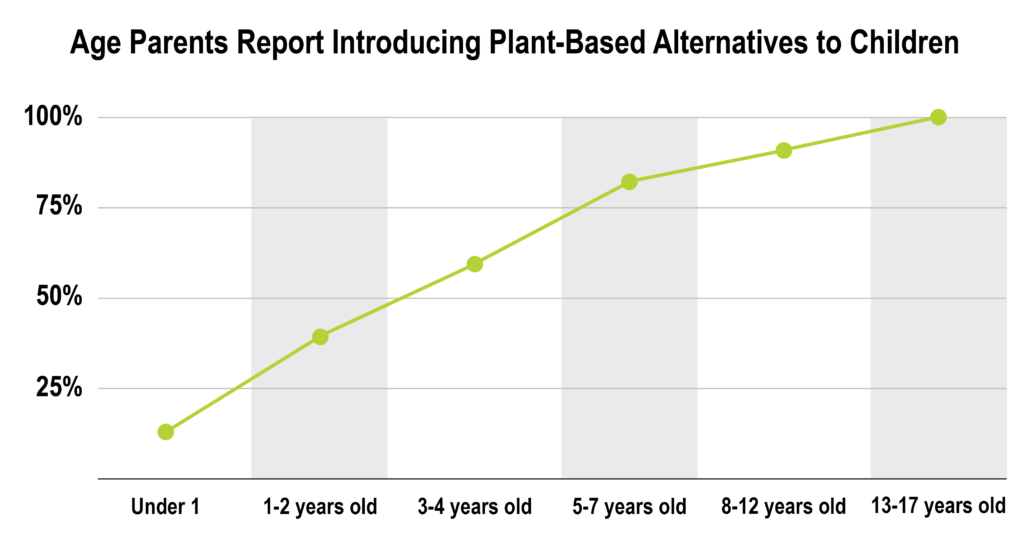There’s no doubt the consumption of plant-based alternatives is mainstream with Americans. 42% of households report purchasing a plant-based alternative in the last year and plant-based innovation has been rampant across categories like dairy, meat, snacks, and frozen meals. Plant-based purchases are even higher among Millennials (49%), and with this generation now in their child-raising years, we were curious to understand how parents are thinking about plant-based when it comes to feeding their children and establishing eating habits.
Our latest study sheds light on this topic. Of households with children, 58% report buying a plant-based alternative in the last year and those purchases are definitely impacting children, with 80% of buying households feeding these products to children. And parents are introducing these plant-based alternatives to children early in life. 80% of those parents who report they have children consuming plant-based alternatives report introducing these foods to children before age 7.

Based on our research, we see 3 main reasons why parents are incorporating plant-based alternatives into their children’s diet which we discuss here.
1: PARENTS ARE FOCUSED ON DEVELOPING HEALTHY EATING HABITS
Parents today are focused on developing balanced eating habits for children at a young age. Their motivation for creating this foundation is to build a healthy and happy future for their children that is free from chronic conditions, like obesity. And to build a future of wellness, parents generally subscribe to the philosophy of ‘nature knows best’ when it comes to eating and seek to replace high sugar processed foods with more natural plant-based options.
“I would like my children to grow up eating fruits and vegetables and not have it be taboo to have one or the other with every meal. I’d like them to maintain a healthy weight and not get obese.
– Millennial Parent
When it comes to specific goals for their children’s diets, parents report they want to reduce and eliminate sugar (49%) while having their children eat more naturally (81%). Eating more naturally includes adding more fruits and vegetables, reducing processed foods, and eating a more plant-based diet.
“I want them to eat healthy – fruits and vegetables are a must but I want them to enjoy the foods as well.
– Millennial Parent
However, getting children to eat this way can be a challenge because of taste, texture, and the wide variety of sugary options available. To bring a variety of healthy options to the table, parents are turning to plant-based alternatives which they see as a simple way to incorporate more plants into their children’s diets. Parents report the most popular and widely consumed plant-based alternatives with children are those that are easily incorporated into the daily routine, including milks (48%), snacks (38%), and yogurt (23%).
2: PARENTS WANT TO TEACH CHILDREN TO EAT SUSTAINABLY
Sustainability is on the minds of Americans today as they consider how our consumption habits will impact the future of the planet. And today’s parenting generation, Millennials, lead the way voicing their ecological concerns and forging new choices that are more sustainable.
According to our latest data, 63% of Millennials agree that farming and production practices impact climate change, 66% believe that if we don’t change how we produce food we won’t have enough in the future, and 16% prioritize sustainable when choosing which foods to buy.
“I want to eat a more plant-based, sustainable, and environmentally friendly diet.
– Millennial
Millennials also feel it’s important to pass this thinking and behavior onto their children and build habits early. 32% of Millennials report that one of their goals when selecting food for their children is to teach them to eat responsibly and plant-based alternatives play a role in making this shift to more sustainable eating.
38% of households that plan to give their children more plant-based alternatives in the future report they will do so because it’s better for the environment
3: PARENTS ARE ADDRESSING SPECIFIC FOOD ALLERGIES & AVOIDANCES
Food allergies and avoidances are prevalent with both adults and children these days. One in 13 children report a specific food allergy and 62% of parents report they have a child avoiding one or more ingredient in their diet. While artificial ingredients rise to the top on the avoidance list, other commonly avoided ingredients among children are dairy (13%), lactose (12%), gluten (11%), and eggs (10%).
20% of parents report they are buying plant-based alternatives to address specific food avoidances and allergies. Plant-based alternatives are a welcome solution for parents to create more variety for an already picky eater who has to avoid certain ingredients.
“My child is picky and has food allergies so sometimes it’s hard to come up with a meal plan.
– Parent of Child with Allergies
PLANT-BASED ALTERNATIVES FOR CHILDREN POSE AN OPPORTUNITY
Plant-based consumption shows no signs of slowing down. The percentage of households reporting they have purchased plant-based alternative is up 5 points over last year, 62% of Americans agree that the plant-based trend will grow in importance, and 67% of parents who are feeding their children plant-based alternatives plan to give their kids more in the future. As we look at the industry, we see that little of the innovation and claims around plant-based has been focused on children and we believe this represents both a gap and opportunity for companies in this space. If your team is seeking more insights on plant-based and kids, Linkage Research has over 10,000 points of data to mine and provides custom research capabilities to help you validate your innovation ideas. To learn more, contact us at info@linkageresearch.com or visit https://linkageresearch.com


